- Home
- Elizabeth Gaskell
Curious, if True: Strange Tales Elizabeth Cleghorn Gaskell Page 4
Curious, if True: Strange Tales Elizabeth Cleghorn Gaskell Read online
Page 4
Why do I tell you all this? I have little to do with the Squire and Madam Starkey; and yet I dwell upon them, as if I were unwilling to come to the real people with whom my life was so strangely mixed up. Madam had been nursed in Ireland by the very woman who lifted her in her arms, and welcomed her to her husband's home in Lancashire. Excepting for the short period of her own married life, Bridget Fitzgerald had never left her nursling. Her marriage—to one above her in rank—had been unhappy. Her husband had died, and left her in even greater poverty than that in which she was when he had first met with her. She had one child, the beautiful daughter who came riding on the waggon-load of furniture that was brought to the Manor-House. Madam Starkey had taken her again into her service when she became a widow. She and her daughter had followed 'the mistress' in all her fortunes; they had lived at St. Germains and at Antwerp, and were now come to her home in Lancashire. As soon as Bridget had arrived there, the Squire gave her a cottage of her own, and took more pains in furnishing it for her than he did in anything else out of his own house. It was only nominally her residence. She was constantly up at the great house; indeed, it was but a short cut across the woods from her own home to the home of her nursling. Her daughter Mary, in like manner, moved from one house to the other at her own will. Madam loved both mother and child dearly. They had great influence over her, and, through her, over her husband. Whatever Bridget or Mary willed was sure to come to pass. They were not disliked; for, though wild and passionate, they were also generous by nature. But the other servants were afraid of them, as being in secret the ruling spirits of the household. The Squire had lost his interest in all secular things; Madam was gentle, affectionate, and yielding. Both husband and wife were tenderly attached to each other and to their boy; but they grew more and more to shun the trouble of decision on any point; and hence it was that Bridget could exert such despotic power. But if every one else yielded to her 'magic of a superior mind,' her daughter not unfrequently rebelled. She and her mother were too much alike to agree. There were wild quarrels between them, and wilder reconciliations. There were times when, in the heat of passion, they could have stabbed each other. At all other times they both—Bridget especially—would have willingly laid down their lives for one another. Bridget's love for her child lay very deep—deeper than that daughter ever knew; or I should think she would never have wearied of home as she did, and prayed her mistress to obtain for her some situation—as waiting-maid—beyond the seas, in that more cheerful continental life, among the scenes of which so many of her happiest years had been spent. She thought, as youth thinks, that life would last for ever, and that two or three years were but a small portion of it to pass away from her mother, whose only child she was. Bridget thought differently, but was too proud ever to show what she felt. If her child wished to leave her, why—she should go. But people said Bridget became ten years older in the course of two months at this time. She took it that Mary wanted to leave her. The truth was, that Mary wanted for a time to leave the place, and to seek some change, and would thankfully have taken her mother with her. Indeed, when Madam Starkey had gotten her a situation with some grand lady abroad, and the time drew near for her to go, it was Mary who clung to her mother with passionate embrace, and, with floods of tears, declared that she would never leave her; and it was Bridget, who at last loosened her arms, and, grave and tearless herself, bade her keep her word, and go forth into the wide world. Sobbing aloud, and looking back continually, Mary went away. Bridget was still as death, scarcely drawing her breath, or closing her stony eyes; till at last she turned back into her cottage, and heaved a ponderous old settle against the door. There she sat, motionless, over the grey ashes of her extinguished fire, deaf to Madam's sweet voice, as she begged leave to enter and comfort her nurse. Deaf, stony, and motionless, she sat for more than twenty hours; till, for the third time, Madam came across the snowy path from the great house, carrying with her a young spaniel, which had been Mary's pet up at the hall, and which had not ceased all night long to seek for its absent mistress, and to whine and moan after her. With tears Madam told this story, through the closed door—tears excited by the terrible look of anguish, so steady, so immovable—so the same to-day as it was yesterday—on her nurse's face. The little creature in her arms began to utter its piteous cry, as it shivered with the cold. Bridget stirred; she moved—she listened. Again that long whine; she thought it was for her daughter; and what she had denied to her nursling and mistress she granted to the dumb creature that Mary had cherished. She opened the door, and took the dog from Madam's arms. Then Madam came in, and kissed and comforted the old woman, who took but little notice of her or anything. And sending up Master Patrick to the hall for fire and food, the sweet young lady never left her nurse all that night. Next day, the Squire himself came down, carrying a beautiful foreign picture: Our Lady of the Holy Heart, the Papists call it. It is a picture of the Virgin, her heart pierced with arrows, each arrow representing one of her great woes. That picture hung in Bridget's cottage when I first saw her; I have that picture now.
Years went on. Mary was still abroad. Bridget was still and stern, instead of active and passionate. The little dog, Mignon, was indeed her darling. I have heard that she talked to it continually; although, to most people, she was so silent. The Squire and Madam treated her with the greatest consideration, and well they might; for to them she was as devoted and faithful as ever. Mary wrote pretty often, and seemed satisfied with her life. But at length the letters ceased—I hardly know whether before or after a great and terrible sorrow came upon the house of the Starkeys. The Squire sickened of a putrid fever; and Madam caught it in nursing him, and died. You may be sure, Bridget let no other woman tend her but herself; and in the very arms that had received her at her birth, that sweet young woman laid her head down, and gave up her breath. The Squire recovered, in a fashion. He was never strong—he had never the heart to smile again. He fasted and prayed more than ever; and people did say that he tried to cut off the entail, and leave all the property away to found a monastery abroad, of which he prayed that some day little Squire Patrick might be the reverend father. But he could not do this, for the strictness of the entail and the laws against the Papists. So he could only appoint gentlemen of his own faith as guardians to his son, with many charges about the lad's soul, and a few about the land, and the way it was to be held while he was a minor. Of course, Bridget was not forgotten. He sent for her as he lay on his death-bed, and asked her if she would rather have a sum down, or have a small annuity settled upon her. She said at once she would have a sum down; for she thought of her daughter, and how she could bequeath the money to her, whereas an annuity would have died with her. So the Squire left her her cottage for life, and a fair sum of money. And then he died, with as ready and willing a heart as, I suppose, ever any gentleman took out of this world with him. The young Squire was carried off by his guardians, and Bridget was left alone.
I have said that she had not heard from Mary for some time. In her last letter, she had told of travelling about with her mistress, who was the English wife of some great foreign officer, and had spoken of her chances of making a good marriage, without naming the gentleman's name, keeping it rather back as a pleasant surprise to her mother; his station and fortune being, as I had afterwards reason to know, far superior to anything she had a right to expect. Then came a long silence; and Madam was dead, and the Squire was dead; and Bridget's heart was gnawed by anxiety, and she knew not whom to ask for news of her child. She could not write, and the Squire had managed her communication with her daughter. She walked off to Hurst; and got a good priest there—one whom she had known at Antwerp—to write for her. But no answer came. It was like crying into the awful stillness of night.
One day, Bridget was missed by those neighbours who had been accustomed to mark her goings-out and comings-in. She had never been sociable with any of them; but the sight of her had become a part of their daily lives, and slow wonder arose in their minds, as m
orning after morning came, and her house-door remained closed, her window dead from any glitter, or light of fire within. At length, some one tried the door; it was locked. Two or three laid their heads together, before daring to look in through the blank, unshuttered window. But, at last, they summoned up courage; and then saw that Bridget's absence from their little world was not the result of accident or death, but of premeditation. Such small articles of furniture as could be secured from the effects of time and damp by being packed up, were stowed away in boxes. The picture of the Madonna was taken down, and gone. In a word, Bridget had stolen away from her home, and left no trace whither she was departed. I knew afterwards, that she and her little dog had wandered off on the long search for her lost daughter. She was too illiterate to have faith in letters, even had she had the means of writing and sending many. But she had faith in her own strong love, and believed that her passionate instinct would guide her to her child. Besides, foreign travel was no new thing to her, and she could speak enough of French to explain the object of her journey, and had, moreover, the advantage of being, from her faith, a welcome object of charitable hospitality at many a distant convent. But the country people round Starkey Manor-House knew nothing of all this. They wondered what had become of her, in a torpid, lazy fashion, and then left off thinking of her altogether. Several years passed. Both Manor-House and cottage were deserted. The young Squire lived far away under the direction of his guardians. There were inroads of wool and corn into the sitting-rooms of the Hall; and there was some low talk, from time to time, among the hinds and country people, whether it would not be as well to break into old Bridget's cottage, and save such of her goods as were left from the moth and rust which must be making sad havoc. But this idea was always quenched by the recollection of her strong character and passionate anger; and tales of her masterful spirit, and vehement force of will, were whispered about, till the very thought of offending her, by touching any article of hers, became invested with a kind of horror: it was believed that, dead or alive, she would not fail to avenge it.
Suddenly she came home; with as little noise or note of preparation as she had departed. One day, some one noticed a thin, blue curl of smoke, ascending from her chimney. Her door stood open to the noon-day sun; and, ere many hours had elapsed, some one had seen an old travel-and-sorrow-stained woman dipping her pitcher in the well; and said, that the dark, solemn eyes that looked up at him were more like Bridget Fitzgerald's than any one else's in this world; and yet, if it were she, she looked as if she had been scorched in the flames of hell, so brown, and scared, and fierce a creature did she seem. By-and-by many saw her; and those who met her eye once cared not to be caught looking at her again. She had got into the habit of perpetually talking to herself; nay, more, answering herself, and varying her tones according to the side she took at the moment. It was no wonder that those who dared to listen outside her door at night, believed that she held converse with some spirit; in short, she was unconsciously earning for herself the dreadful reputation of a witch.
Her little dog, which had wandered half over the Continent with her, was her only companion; a dumb remembrancer of happier days. Once he was ill; and she carried him more than three miles, to ask about his management from one who had been groom to the last Squire, and had then been noted for his skill in all diseases of animals. Whatever this man did, the dog recovered; and they who heard her thanks, intermingled with blessings (that were rather promises of good fortune than prayers), looked grave at his good luck when, next year, his ewes twinned, and his meadow-grass was heavy and thick.
Now it so happened that, about the year seventeen hundred and eleven, one of the guardians of the young Squire, a certain Sir Philip Tempest, bethought him of the good shooting there must be on his ward's property; and, in consequence, he brought down four or five gentlemen, of his friends, to stay for a week or two at the Hall. From all accounts, they roystered and spent pretty freely. I never heard any of their names but one, and that was Squire Gisborne's. He was hardly a middle-aged man then; he had been much abroad, and there, I believe, he had known Sir Philip Tempest, and done him some service. He was a daring and dissolute fellow in those days: careless and fearless, and one who would rather be in a quarrel than out of it. He had his fits of ill-temper beside, when he would spare neither man nor beast. Otherwise, those who knew him well, used to say he had a good heart, when he was neither drunk, nor angry, nor in any way vexed. He had altered much when I came to know him.
One day, the gentlemen had all been out shooting, and with but little success, I believe; anyhow, Mr. Gisborne had had none, and was in a black humour accordingly. He was coming home, having his gun loaded, sportsman-like, when little Mignon crossed his path, just as he turned out of the wood by Bridget's cottage. Partly for wantonness, partly to vent his spleen upon some living creature, Mr. Gisborne took his gun, and fired—he had better have never fired gun again, than aimed that unlucky shot. He hit Mignon; and at the creature's sudden cry, Bridget came out, and saw at a glance what had been done. She took Mignon up in her arms, and looked hard at the wound; the poor dog looked at her with his glazing eyes, and tried to wag his tail and lick her hand, all covered with blood. Mr. Gisborne spoke in a kind of sullen penitence:
'You should have kept the dog out of my way—a little poaching varmint.'
At this very moment, Mignon stretched out his legs, and stiffened in her arms—her lost Mary's dog, who had wandered and sorrowed with her for years. She walked right into Mr. Gisborne's path, and fixed his unwilling, sullen look with her dark and terrible eye.
'Those never throve that did me harm,' said she. 'I'm alone in the world, and helpless; the more do the Saints in Heaven hear my prayers. Hear me, ye blessed ones! hear me while I ask for sorrow on this bad, cruel man. He has killed the only creature that loved me—the dumb beast that I loved. Bring down heavy sorrow on his head for it, O ye Saints! He thought that I was helpless, because he saw me lonely and poor; but are not the armies of Heaven for the like of me?'
'Come, come,' said he, half-remorseful, but not one whit afraid. 'Here's a crown to buy thee another dog. Take it, and leave off cursing! I care none for thy threats.'
'Don't you?' said she, coming a step closer, and changing her imprecatory cry for a whisper which made the gamekeeper's lad, following Mr. Gisborne, creep all over. 'You shall live to see the creature you love best, and who alone loves you—ay, a human creature, but as innocent and fond as my poor, dead darling—you shall see this creature, for whom death would be too happy, become a terror and a loathing to all, for this blood's sake. Hear me, O holy Saints, who never fail them that have no other help!'
She threw up her right hand, filled with poor Mignon's life-drops; they spirted, one or two of them, on his shooting-dress,—an ominous sight to the follower. But the master only laughed a little, forced, scornful laugh, and went on to the Hall. Before he got there, however, he took out a gold piece, and bade the boy carry it to the old woman on his return to the village. The lad was 'afeard,' as he told me in after years; he came to the cottage, and hovered about, not daring to enter. He peeped through the window at last; and by the flickering wood-flame, he saw Bridget kneeling before the picture of our Lady of the Holy Heart, with dead Mignon lying between her and the Madonna. She was praying wildly, as her outstretched arms betokened. The lad shrank away in redoubled terror; and contented himself with slipping the gold-piece under the ill-fitting door. The next day it was thrown out upon the midden; and there it lay, no one daring to touch it.
Meanwhile Mr. Gisborne, half curious, half uneasy, thought to lessen his uncomfortable feelings by asking Sir Philip who Bridget was? He could only describe her—he did not know her name. Sir Philip was equally at a loss. But an old servant of the Starkeys, who had resumed his livery at the Hall on this occasion—a scoundrel whom Bridget had saved from dismissal more than once during her palmy days—said:—
'It will be the old witch, that his worship means. She needs a ducking, if ev
er woman did, does that Bridget Fitzgerald.'
'Fitzgerald!' said both the gentlemen at once. But Sir Philip was the first to continue:
'I must have no talk of ducking her, Dickon. Why, she must be the very woman poor Starkey bade me have a care of; but when I came here last she was gone, no one knew where. I'll go and see her tomorrow. But mind you, sirrah, if any harm comes to her, or any more talk of her being a witch—I've a pack of hounds at home, who can follow the scent of a lying knave as well as ever they followed a dog-fox; so take care how you talk about ducking a faithful old servant of your dead master's.'
'Had she ever a daughter?' asked Mr. Gisborne, after a while.
'I don't know—yes! I've a notion she had; a kind of waiting-woman to Madam Starkey.'
'Please your worship,' said humbled Dickon, 'Mistress Bridget had a daughter—one Mistress Mary—who went abroad, and has never been heard on since; and folk do say that has crazed her mother.'
Mr. Gisborne shaded his eyes with his hand.
'I could wish she had not cursed me,' he muttered. 'She may have power—no one else could.' After a while, he said aloud, no one understanding rightly what he meant, 'Tush! it's impossible!'—and called for claret; and he and the other gentlemen set to to a drinking-bout.

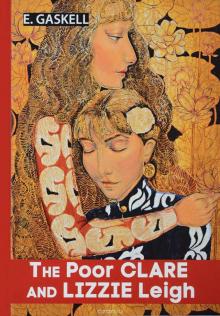 Lizzie Leigh
Lizzie Leigh The Poor Clare
The Poor Clare Lois the Witch
Lois the Witch North and South
North and South Sexton's Hero
Sexton's Hero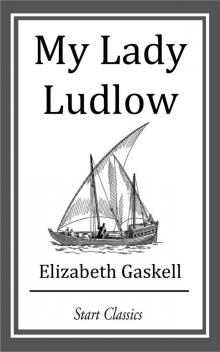 My Lady Ludlow
My Lady Ludlow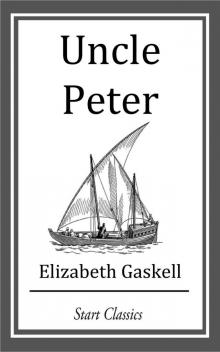 Uncle Peter
Uncle Peter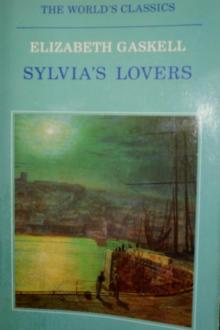 Sylvia's Lovers Elizabeth Cleghorn Gaskell
Sylvia's Lovers Elizabeth Cleghorn Gaskell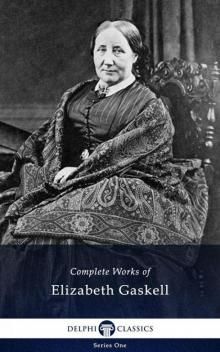 Delphi Complete Works of Elizabeth Gaskell
Delphi Complete Works of Elizabeth Gaskell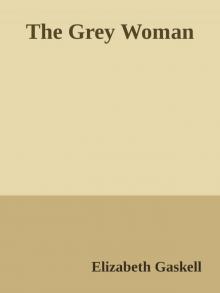 The Grey Woman
The Grey Woman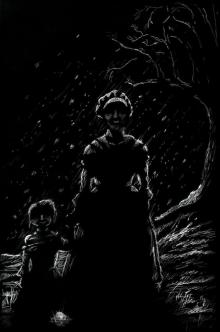 The Old Nurse's Story and Other Tales
The Old Nurse's Story and Other Tales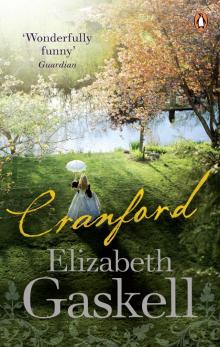 Cranford
Cranford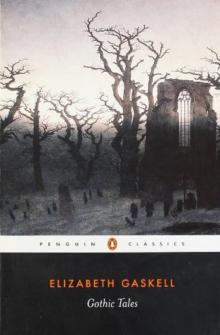 Gothic Tales
Gothic Tales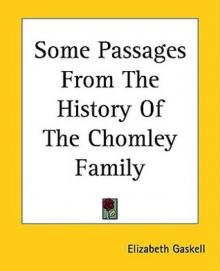 Some Passages From the History of the Chomley Family
Some Passages From the History of the Chomley Family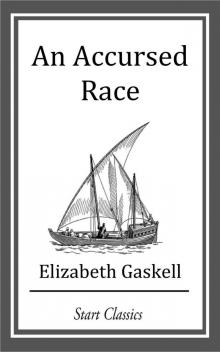 An Accursed Race
An Accursed Race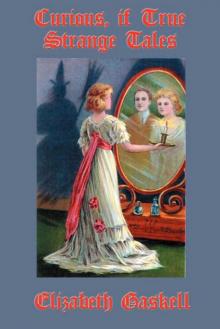 Curious, if True: Strange Tales Elizabeth Cleghorn Gaskell
Curious, if True: Strange Tales Elizabeth Cleghorn Gaskell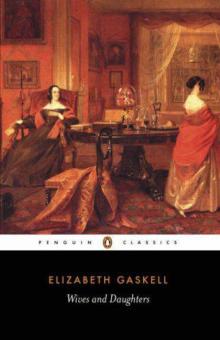 Wives and Daughters
Wives and Daughters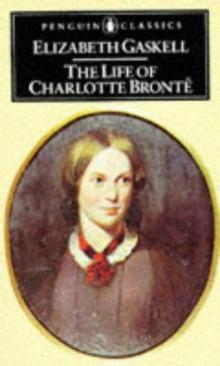 The life of Charlotte Brontë
The life of Charlotte Brontë